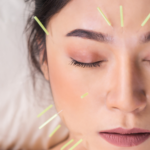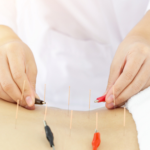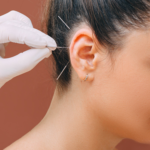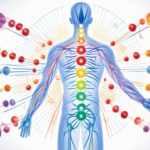“Sleep Quality” Over 2 million healthcare providers use UpToDate. They are from all over the world. They use it to help in making decisions. Many of them are now using acupuncture to help people Sleep Quality better. It can improve sleep quality. It helps you wake up less at night and sleep longer. It also eases anxiety and pain. It’s a good alternative to sleeping pills.
Acupuncture helps those who suffer from insomnia. This may be due to depression. It may also be due to menopause or chronic pain. In a typical session, a practitioner will insert 5 to 20 needles. These needles stay in for 10 to 15 minutes. They use acupuncture to check the flow of energy, or “qi,” in the body.
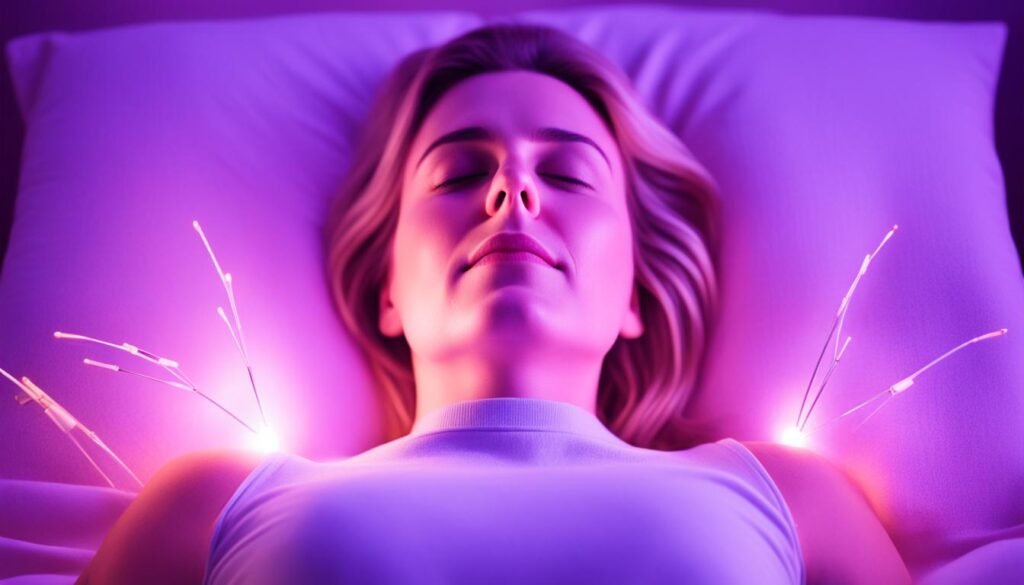
Acupuncture is usually safe and has very few major risks. In rare cases, you might get an infection. You could also get skin irritation or bleeding. Yet, some people should be cautious. This includes pregnant women. It also includes individuals with bleeding disorders. It includes people on blood thinners. It also includes those with pacemakers. It includes those with weak immune systems.
Introduction to Acupuncture for Insomnia
Acupuncture is a natural way to help with insomnia. It’s part of traditional Chinese medicine. Insert thin needles into specific areas of the body. These spots help to move energy, or “qi”, through the body.
What is acupuncture?
Acupuncture is an old healing method from China. It believes that our body has vital energy, or qi, flowing through pathways. If this energy becomes blocked, it can cause health problems, such as insomnia.
Acupuncture uses fine needles in certain spots to treat this condition. It helps balance the qi flow. This can help treat sleep disorders.
How does acupuncture work for insomnia?
For insomnia, acupuncture helps control hormones such as endorphins, serotonin, and melatonin. These hormones help us sleep. It also reduces tension, pain, and stress that can keep us awake.
This can lead to better sleep for people with insomnia.
Acupuncture boosts sleep quality, previous research reveals. It helps patients with insomnia and mood disorders.
Perform a full check-up to treat insomnia with acupuncture. The acupuncturist selects certain spots to help balance the qi. This aims to resolve the sleep problems.
Acupuncture Regulates Sleep Cycles
Acupuncture helps regulate the body’s sleep patterns. It employs special points to calm the body. This facilitates a smooth transition from being awake to being ready for sleep.
It also helps by changing the levels of important chemicals in the body. These chemicals, such as serotonin and melatonin, help you sleep well. Acupuncture can fix sleep problems like insomnia by balancing these chemicals.
In New Zealand, about 1.5% to 8.9% of adults have sleep issues. Studies show that acupuncture can help. It makes falling asleep easier and helps you sleep for longer.
Acupuncture resolves insomnia caused by menopausal symptoms, researchers have discovered.
Acupuncture helps fix sleep problems by balancing your body’s natural sleep cycle. It’s a safe, natural way to improve sleep. It’s great for those who want to avoid medications.
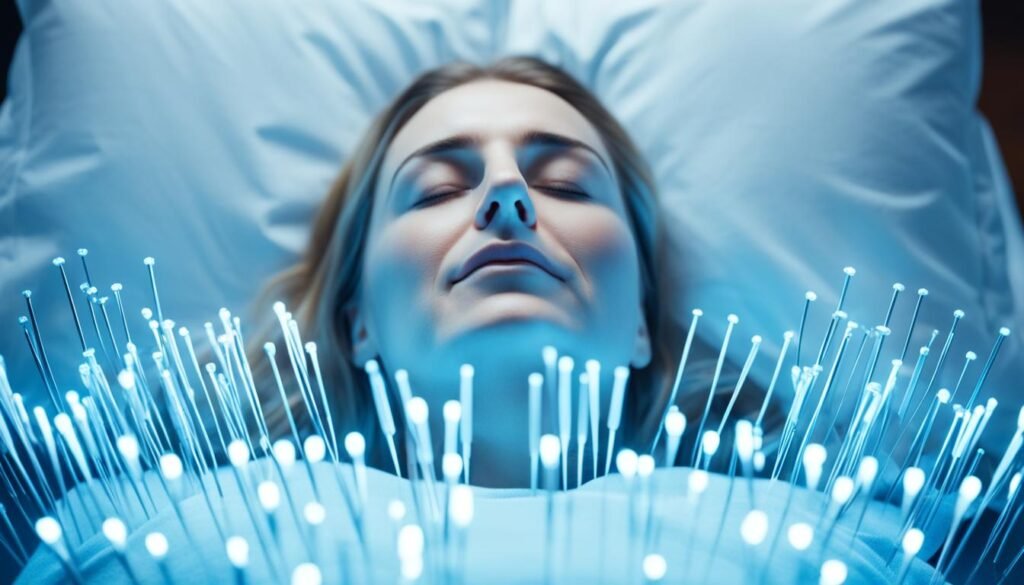
Acupuncture Reduces Stress and Anxiety
Stress and anxiety can make it difficult to sleep. They keep the mind occupied and prevent the body from relaxing. Acupuncture helps by improving the functioning of the sympathetic nervous system.
Acupuncture uses special points on the body. It makes the body release chemicals, such as serotonin and dopamine. These chemicals make you feel calm and happy. This can help you sleep better.
The connection between stress and insomnia
People with chronic insomnia often feel more anxious and depressed. In fact, they are 8.8 times more likely to have anxiety disorders. They are 8.4 times more likely to have depression than healthy individuals.
How acupuncture calms the mind
Acupuncture helps people sleep better, especially those with mental health issues. It induces a deeper sleep and reduces nighttime wake-ups. You’ll fall asleep faster and feel less fatigued during the day.
It also helps with feelings and instincts. This leads to a calmer mind.
Get acupuncture 1-2 times a week. This is for ongoing chronic anxiety, depression, or sleep disorders.
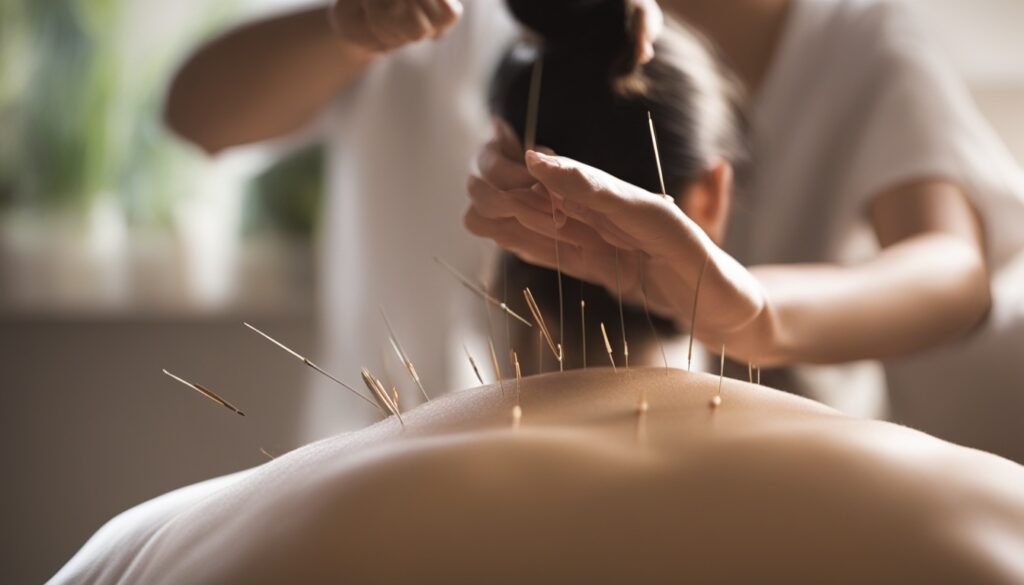
Acupuncture Balances Hormones
Hormones such as melatonin, cortisol, and serotonin affect sleep patterns. These hormones help us to sleep and wake up. Acupuncture can help correct imbalances in these hormone levels.
The Role of Hormones in Sleep
Acupuncture uses special points to increase melatonin production. Melatonin helps us sleep. It also lowers cortisol levels. High cortisol levels can keep us awake due to stress.
A study looked at 46 trials with 3,811 people who couldn’t sleep well. Acupuncture made their sleep better and longer. This shows that acupuncture can balance sleep hormones and help people sleep better.
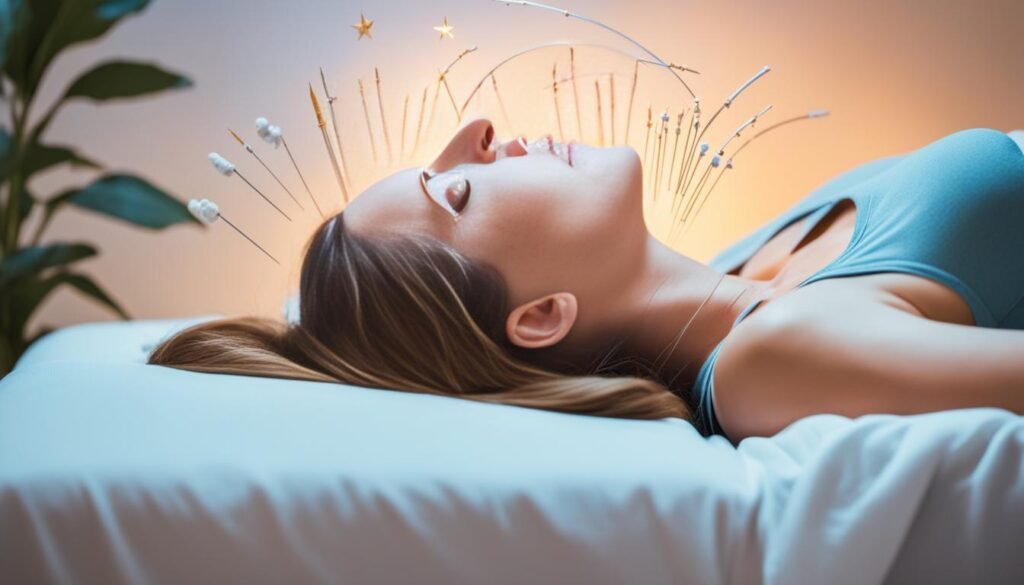
Studies have shown that acupuncture and acupressure improve sleep. They offer easy and effective alternatives or additions to modern insomnia treatments.
Acupuncture helps produce the right amount of melatonin and cortisol. This induces a deeper sleep. It’s a great way to combat insomnia and sleep disorders.
Acupuncture Promotes Relaxation
Acupuncture induces a state of profound relaxation. It can improve sleep quality. It employs special points to stimulate the “rest and digest” system in your body.
This system makes you feel calm and relaxed. It releases happy chemicals, such as endorphins and serotonin. These help with stress, anxiety, and tension that can keep you awake at night.
Acupuncture works on the “rest and digest” system. It combats the negative effects of stress. This allows your mind and body to prepare for sleep.
When you’re more relaxed, it’s easier to fall and stay asleep. This makes your sleep better.
Some acupuncture points help you relax more. Points like the Spirit Gate (HT7) and Three Yin Intersection (SP6) are good for this. They help to relax your muscles.
Acupuncture is a natural and holistic way to manage stress. It offers long-lasting benefits compared to some temporary methods.
Studies show that acupuncture lowers stress. People feel better right away and for a long time. More people are choosing acupuncture for better sleep and overall well-being.
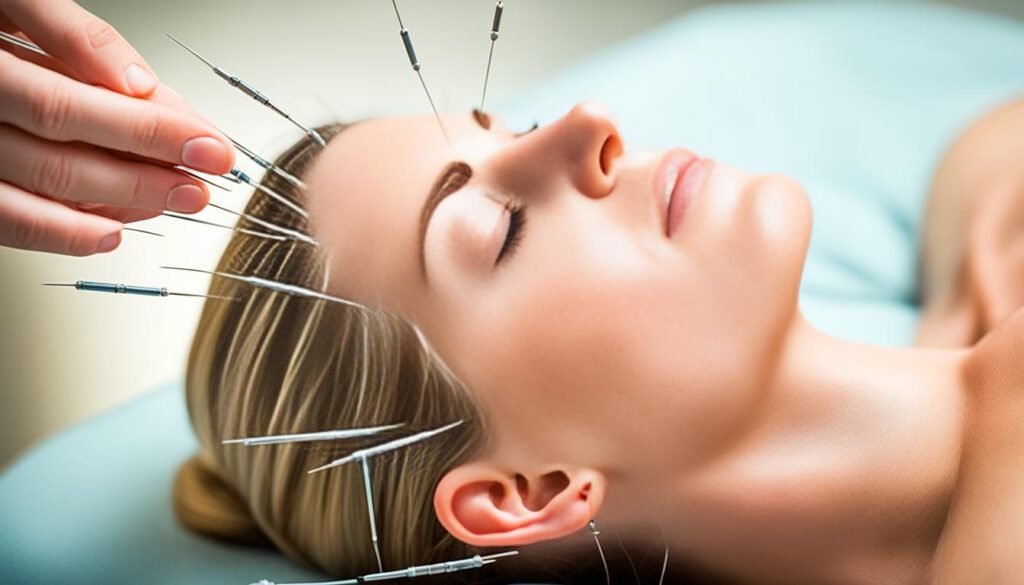
Acupuncture Alleviates Pain
Chronic pain makes it difficult to sleep well. It’s uncomfortable and disrupts sleep. Yet, acupuncture can help reduce the discomfort. It’s an old Chinese practice that treats pain.
Acupuncture helps with musculoskeletal, neuropathic, and inflammatory pain. It utilizes special points to reduce pain. This can reduce inflammation. It releases happy chemicals. And it changes how we perceive pain.
Studies show that acupuncture helps people with fibromyalgia feel less pain. It can make a big difference. Science backs this up.
For those with Parkinson’s disease, acupuncture can make things better. It helps with sleep, feeling down, feeling anxious, and feeling tired. Its effectiveness is unclear, but it calms the nervous system, offering aid.
By easing pain, acupuncture can lead to better sleep. This means you can feel healthier and happier. When you’re not in pain, you can relax and sleep well.
How Pain Disrupts Sleep
Chronic pain can ruin sleep. It makes it difficult to fall asleep and stay asleep. This can make the pain feel even worse, making sleep even harder.
Pain Relief through Acupuncture
Acupuncture is good at easing pain. It uses special points to help. This can reduce inflammation, release happy chemicals, and alter pain signals.
As pain subsides, you can relax and sleep better. This is one of acupuncture’s significant benefits.
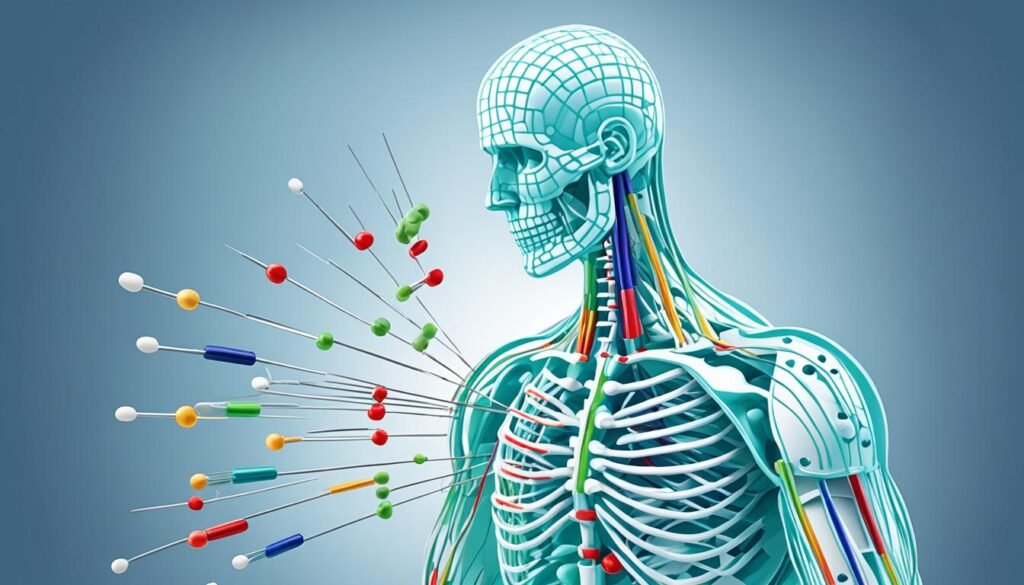
Acupuncture eliminates chronic pain and alleviates headaches. This is a cornerstone of its top benefits.
Common Acupuncture Points for Better Sleep
Acupuncturists use many acupuncture points to help improve sleep. Some top points they use are:
Spirit Gate (HT7)
You can find the Spirit Gate (HT7) point on the inner wrist. It calms the mind and helps you relax for better sleep. This point can also reduce insomnia, anxiety, and stress.
Three Yin Intersection (SP6)
The Three Yin Intersection (SP6) point is on the inner ankle. It’s great for people with insomnia. It balances the body’s energies for better sleep.
Tai Chong (LV3)
The top of the foot houses the Tai Chong (LV3) point. It assists in lowering high blood pressure, enhancing blood flow, and alleviating anxiety. All these can aid in improving your sleep quality.
An Mian
The An Mian point resides on the back of the neck. It’s beneficial for treating insomnia, anxiety, and headaches. This point assists in relaxing and sleeping better.
Yin Tang
Located between the eyebrows is the Yin Tang point. It lowers high blood pressure, stress, and tension. These are things that can affect sleep. This point can improve sleep quality.
Acupuncturists use these common points to help people with sleep problems. They can make sleep quality improve significantly.
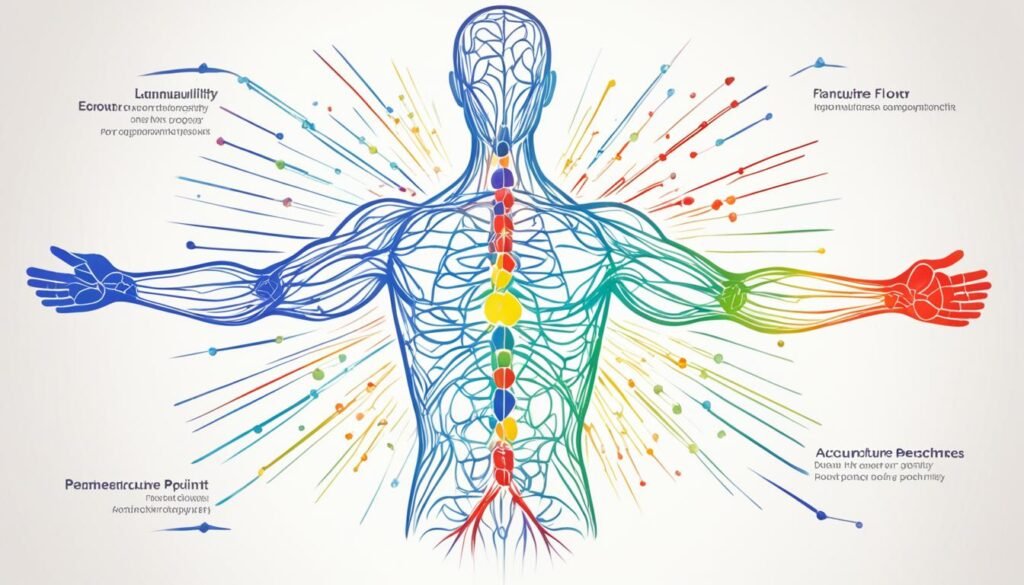
Acupuncture Boosts Sleep Quality
Many studies show that acupuncture helps people sleep a lot. It increases sleep duration, improves sleep quality, and reduces waking episodes. It can add up to three hours to sleep time.
Acupuncture fixes the body’s sleep clock, balances hormones, lowers stress, and eases pain. These things are key for good sleep. A study with 78 people who had Parkinson’s disease and bad sleep found that acupuncture helped a lot.
People who received real acupuncture scored 29.65 points better on a sleep scale. Those who got fake acupuncture scored 10.47 points better. At eight weeks later, the real acupuncture group was still doing much better.
This shows that acupuncture helps people sleep better and for a longer period. It makes sleep more restful and better for those with sleep difficulties.
Real acupuncture helped. It provided lasting benefits. It improved sleep quality in patients with Parkinson’s disease.
The study also found that real acupuncture helped with other symptoms. These symptoms include movement issues, sleepiness, and anxiety. It also made people feel better about their health.
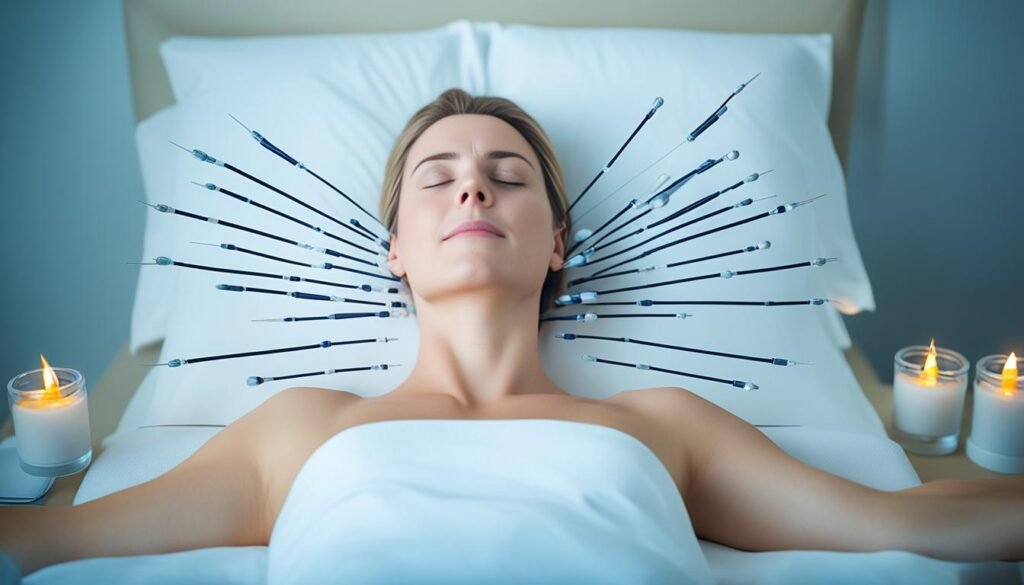
What to Expect During an Acupuncture Session
Are you considering acupuncture for better sleep? You might wonder what happens in a session. Acupuncture is a special way to help you relax and balance your body. It’s a structured process for treating sleep problems.
The Acupuncture Consultation
Your session begins with a detailed talk with the practitioner. They will ask about your health history, sleep habits, and what keeps you awake at night. This creates a personalized plan tailored to your unique needs.
Needle Insertion and Treatment
The acupuncturist picks certain points on your body and inserts thin, clean needles. These needles stay in for about 10-15 minutes. You’ll feel very relaxed during this time.
They might also use moxibustion or cupping to help you even more. After your first session, you might need more treatments to get better sleep. Acupuncture fixes your sleep cycles. It also lessens stress, and balances your hormones. It helps you relax.
Research has shown that acupuncture is effective for insomnia. It can improve sleep quality, reduce the time it takes to fall asleep, and increase sleep duration.
Knowing what happens in an acupuncture session can make you feel ready and hopeful. It’s a natural way to get better sleep without using drugs.
Additional Benefits of Acupuncture
Acupuncture helps with sleep, but it also has many other benefits. It can make you feel better. It helps with pain, makes your mind healthier, and boosts your mood.
Pain Relief
Acupuncture is great for easing pain. The National Institutes of Health state that it can help with back, neck, and knee pain. It utilizes special points to reduce pain without medication.
Improved Mental Health
Acupuncture can make you feel better mentally. It helps with anxiety, depression, and stress. This can also help you sleep better too.
Better Overall Well-being
Acupuncture boosts your energy and helps your immune system. It makes you feel good. When it helps with sleep, it improves your life in many ways.
Acupuncture does more than help you sleep. It can ease pain, improve your mood, and make you feel better. It’s a holistic way to improve your life.
Lifestyle Tips for Better Sleep
Acupuncture can help with insomnia, but healthy habits can make it even better. Here are some tips for better sleep:
Maintain a Sleep Schedule
It’s important to sleep and wake up at the same time every day. This helps your body stay on track. Even on weekends, stick to your regular sleep schedule.
Create a Sleep-Friendly Environment
Make your bedroom dark, quiet, and cool for better sleep. Don’t use phones, tablets, or TVs in bed. The blue light from screens can disrupt your sleep.
Practice Relaxation Techniques
Relaxation techniques, such as deep breathing and meditation, help calm you down. They make it easier to fall asleep. Incorporating these techniques into your bedtime routine can improve your sleep.
Changing your lifestyle for better sleep can boost the effects of acupuncture. This leads to more restful sleep. Remember, good sleep is crucial to your overall health and well-being.
Safety and Side Effects of Acupuncture
Acupuncture is safe and well-liked, with a low risk of serious side effects. You might see some minor bleeding or bruising where the needles go in. You might feel a bit of pain or discomfort during the treatment. After that, you might feel tired or sleepy.
But, some people should be careful before trying acupuncture. If you have bleeding problems, take blood thinners, or are pregnant, talk to your doctor first. It’s important to know that acupuncture might not be good for people with some health issues. This includes those with a pacemaker or who have had surgery recently.
Most people think that acupuncture is safe and well-tolerated. It has a low risk of serious side effects.
Tell a qualified acupuncturist about your health history. Tell them about any health issues you have before starting treatment. They can tell you about acupuncture’s safety for sleep. They can also warn about side effects and things to avoid.
Acupuncture is safe and helps many health issues. It can treat sleep problems. With a licensed acupuncturist, you receive treatment with confidence. This way, you can avoid any possible side effects or issues.
You May Also Like:
Better Lung Health: 7 Acupuncture Techniques
Finding an Acupuncturist for Insomnia
If you want acupuncture for insomnia, find a licensed and skilled practitioner. They should focus on sleep issues. Make sure that the National Certification Commission certifies them. It is through the National Certification Commission for Acupuncture and Oriental Medicine (NCCAOM). They should also know how to use acupuncture to help you sleep better.
Ask the acupuncturist about their methods. Ask how they’ve helped others sleep. Ask them about their experience. Also, ask about the special techniques they use for sleep problems.
Also, ask if they use other treatments like herbal medicine or advice on how to live better. Combining acupuncture with other therapies promotes restful sleep.
About a quarter of people worldwide have trouble sleeping. This illustrates how crucial it is to find the right acupuncturist. With a skilled professional, you can improve your sleep. You will also feel better.
Studies have shown that acupuncture increases melatonin levels. This is true for people with insomnia and anxiety. Melatonin is crucial for the sleep-wake cycle.
- Look for acupuncturists certified by the NCCAOM.
- Discuss the practitioner’s approach. Also, discuss their treatment plan and their experience in helping patients with insomnia.
- Ask about extra therapies. These include herbal medicine and lifestyle advice. The acupuncturist may use them as well.
Conclusion
Acupuncture is a great way to help you sleep better without using drugs. Many studies show that it works well. It helps your body’s sleep cycle, balances your hormones, and lowers stress and pain.
If you have trouble sleeping now and then or all the time, acupuncture can help. It can make you feel more awake and full of energy. Acupuncture ensures that you sleep well and feel good.
This article talks about how acupuncture helps with sleep. It’s a good choice if you want to sleep better. Try acupuncture and see how it changes your health and happiness.




